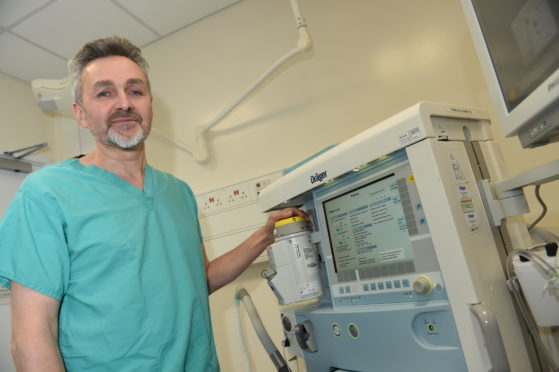Anaesthetists in Inverness have reduced the hospital’s CO2 equivalent emissions by 4.5% and saved NHS Highland £73,000 a year – simply by changing the gas they use in operations.
Historically they, and the wider NHS, have used Desflurane, an agent 60 times more polluting per hour of anaesthesia then a similar gas, Sevoflurane.
Since January this year, the consultants have reduced their use of Desflurane at Raigmore to zero by no longer ordering it and switching to Sevoflurane.
Leading the environmental charge is consultant anaesthetist Kenneth Barker.
He said: “To put the 4.5% reduction in context, all the hospital’s heating and hot water produces about 10% of its CO2 equivalent emissions.
“An eight hour operation using Desflurane is the equivalent of 4,206 miles in an average car.”
NHS Highland is the first NHS Board in the UK to remove Desflurane from stock order, making it special order only.
Mr Barker said: “Sevoflurane is clinically just as good, so in practice, no one will order Desflurane. It’s still a pollutant, but far less so.
“It’s also worth noting that Desflurane is less potent than Sevflurane so you had to use three times as much.”
Mr Barker has recently been spreading the word to colleagues by giving talks during visits to London and Cardiff, and he and his colleagues are encouraging anaesthetists all over the country to follow their lead.
He said: “I would get rid of Desflurane entirely from the NHS for the next few years at least, as there is new technology coming along which aims to get rid of all anaesthetic agent pollution by capturing it in silicone meshes and recycling and re-using it.”
The Raigmore anaesthetists are now pushing for the hidden environmental costs of NHS drugs and supplies to become a routine part of assessing their suitability at a national procurement level.
Mr Barker said: “Pharmaceutical companies should be required to submit ratified data on full life cycle carbon cost, and atmospheric, water and ground pollution information of every product they submit to Scottish Medicines Consortium and National Services Scotland who are the procurement/contract people.”
NHS Highland’s environmental sustainability team is also actively assessing other ways in which it can contribute to pollution reduction.
A spokeswoman said: “There are a number of ongoing projects across the organisation which staff have really begun to embrace.”
